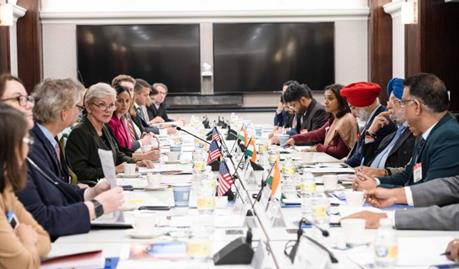U.S.-India Strategic Clean Energy Partnership: Strengthening Clean Energy Ties
The ministers welcomed the formal launch of the Renewable Energy Technology Action Platform (RETAP) in August 2023, aimed at developing actionable roadmaps.
The U.S.-India Strategic Clean Energy Partnership (SCEP) Ministerial in Washington, D.C. marked a significant step forward in advancing clean energy collaboration between the two nations. Led by U.S. Energy Secretary Jennifer Granholm and India’s Minister of Petroleum and Natural Gas, Hardeep Singh Puri, the meeting focused on strengthening energy security, accelerating clean energy transitions, and fostering innovation across key sectors such as renewable energy, energy efficiency, and sustainable fuels.
significant step forward in advancing clean energy collaboration between the two nations. Led by U.S. Energy Secretary Jennifer Granholm and India’s Minister of Petroleum and Natural Gas, Hardeep Singh Puri, the meeting focused on strengthening energy security, accelerating clean energy transitions, and fostering innovation across key sectors such as renewable energy, energy efficiency, and sustainable fuels.
Progress on Clean Energy Initiatives
The partnership builds on several key initiatives to address clean energy goals in both nations. Notably, the ministers acknowledged progress in deploying renewable energy, promoting energy efficiency, and decarbonizing high-emitting sectors such as industry and transportation. They also highlighted the formal launch of the Renewable Energy Technology Action Platform (RETAP), aimed at advancing hydrogen, energy storage, and offshore wind technologies. This initiative underscores the commitment of both countries to support research, development, and the deployment of emerging clean energy technologies.
Focus on Hydrogen and Energy Storage
Hydrogen technology played a central role in the discussions. The ministers welcomed the establishment of the National Centre for Hydrogen Safety in India and noted the success of the 2nd International Conference on Green Hydrogen held in September 2024. The bilateral collaboration on clean hydrogen research and development (R&D), cost reduction, and hydrogen hub development was highlighted as a crucial step toward advancing clean energy technologies.
Energy storage is another crucial area of focus under SCEP. The public-private Energy Storage Task Force was formally launched to address policy, regulatory frameworks, and supply chains. The partnership also aims to explore alternative technologies to lithium-ion batteries, supporting long-duration energy storage and pumped storage solutions to ensure renewable energy reliability.
Advancing Power Sector Reforms and Smart Grids
The ministers stressed the importance of modernising the power distribution sector to ensure a reliable power supply 24/7. Both countries supported India’s smart metering deployment, power market reforms, and cybersecurity measures. The collaborative efforts between India and the U.S. through programs like the US-India Collaborative for Smart Distribution Systems with Storage (UI-ASSIST) were recognised for enhancing grid resilience and energy storage capabilities.
Sustainable Transport and Aviation
A significant portion of the discussions was dedicated to sustainable transportation. The ministers celebrated the progress in electrifying medium—and heavy-duty vehicles, focusing on deploying 10,000 e-buses across India through the PM eBus Sewa scheme. Additionally, new collaborations were launched on sustainable aviation fuels (SAF), with both countries agreeing to work on fuel certification, supply chain capacity building, and market development to accelerate the adoption of cleaner fuels in aviation.
Methane Abatement and Carbon Capture
Efforts to reduce methane emissions in the oil and gas sector were also discussed, focusing on technical cooperation and policy support. Additionally, both nations emphasised the importance of carbon capture, utilisation, and storage (CCUS) technologies, highlighting recent advancements and collaboration on geologic carbon storage and regulatory frameworks.
Strengthening Clean Energy Supply Chains
The ministers highlighted the importance of building secure, resilient, diversified, clean energy supply chains. Both nations welcomed increased investment in clean energy markets, including a recent investment by Indian company Waaree in a solar module manufacturing facility in Texas. These investments are vital to ensuring the long-term success of the clean energy transition.
The U.S.-India SCEP Ministerial demonstrated both countries’ shared commitment to tackling climate challenges through innovation, collaboration, and strategic partnerships. By leveraging this partnership, the U.S. and India aim to drive clean energy transitions, enhance energy security, and build resilient, diversified supply chains, thereby positioning themselves as global leaders in clean energy.
